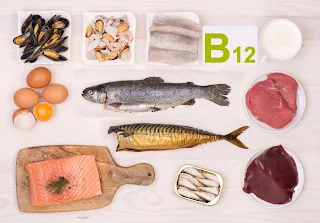Overview Of Vitamins
Vitamins are essential organic compounds that are necessary for various biochemical processes in the body. They play crucial roles in metabolism, growth, and overall health. While the body can produce some vitamins, it cannot synthesize enough of them to meet its needs, so they must be obtained through diet. There are 13 essential vitamins, each with its own specific functions and sources. These include vitamins A, C, D, E, K, and the B vitamins (thiamine, riboflavin, niacin, pantothenic acid, biotin, vitamin B6, vitamin B12, and folate). A balanced diet containing a variety of fruits, vegetables, grains, protein sources, and dairy products typically provides an adequate intake of vitamins.
There are 13 essential vitamins, each with its own unique
functions and roles:
Vitamin A: Important for vision, immune function, and skin
health. It is found in foods such as liver, carrots, sweet potatoes, and leafy
green vegetables.
Vitamin B1 (Thiamine): Plays a key role in energy
metabolism, nerve function, and carbohydrate metabolism. Good sources include
whole grains, nuts, pork, and beans.
Vitamin B2 (Riboflavin): Essential for energy production,
growth, and red blood cell formation. It is found in dairy products, leafy
green vegetables, and fortified cereals.
Vitamin B3 (Niacin): Necessary for energy production, DNA
repair, and skin health. Food sources include meat, fish, nuts, and whole
grains.
Vitamin B5 (Pantothenic Acid): Important for synthesizing
and metabolizing carbohydrates, proteins, and fats. It is found in a wide
variety of foods, including meat, whole grains, and vegetables.
Vitamin B6: Involved in amino acid metabolism,
neurotransmitter synthesis, and immune function. Good sources include poultry,
fish, bananas, and potatoes.
Vitamin B7 (Biotin): Necessary for metabolism, cell growth,
and the production of fatty acids. Foods like eggs, nuts, seeds, and leafy
greens contain biotin.
Vitamin B9 (Folate): Essential for DNA synthesis, cell
division, and fetal development during pregnancy. It is found in leafy green
vegetables, legumes, and fortified grains.
Vitamin B12: Important for nerve function, DNA synthesis,
and red blood cell formation. It is primarily found in animal products such as
meat, fish, eggs, and dairy.
Vitamin C: Acts as an antioxidant, supports immune function,
and aids in collagen synthesis. Citrus fruits, strawberries, kiwi, and bell
peppers are rich sources of vitamin C.
Vitamin D: Essential for calcium absorption, bone health,
and immune function. Sunlight exposure triggers vitamin D synthesis in the
skin, and it is also found in fatty fish, fortified dairy products, and
mushrooms.
Vitamin E: Acts as an antioxidant, protecting cells from
damage caused by free radicals. Nuts, seeds, vegetable oils, and leafy greens
are good sources of vitamin E.
Vitamin K: Necessary for blood clotting and bone health. It
is found in leafy green vegetables, broccoli, and soybeans.
While vitamins are crucial for health, it's important to
obtain them through a balanced diet rather than relying solely on supplements,
as whole foods provide a combination of vitamins, minerals, and other
beneficial nutrients that work synergistically for optimal health. Deficiencies
or excess intake of vitamins can lead to various health problems, so it's
essential to consume them in appropriate amounts as part of a well-rounded
diet.
.jpg)

.jpg)
.jpg)
.jpg)

.jpg)

.jpg)

.jpg)

.jpg)
.jpg)
.jpg)


No comments:
Post a Comment